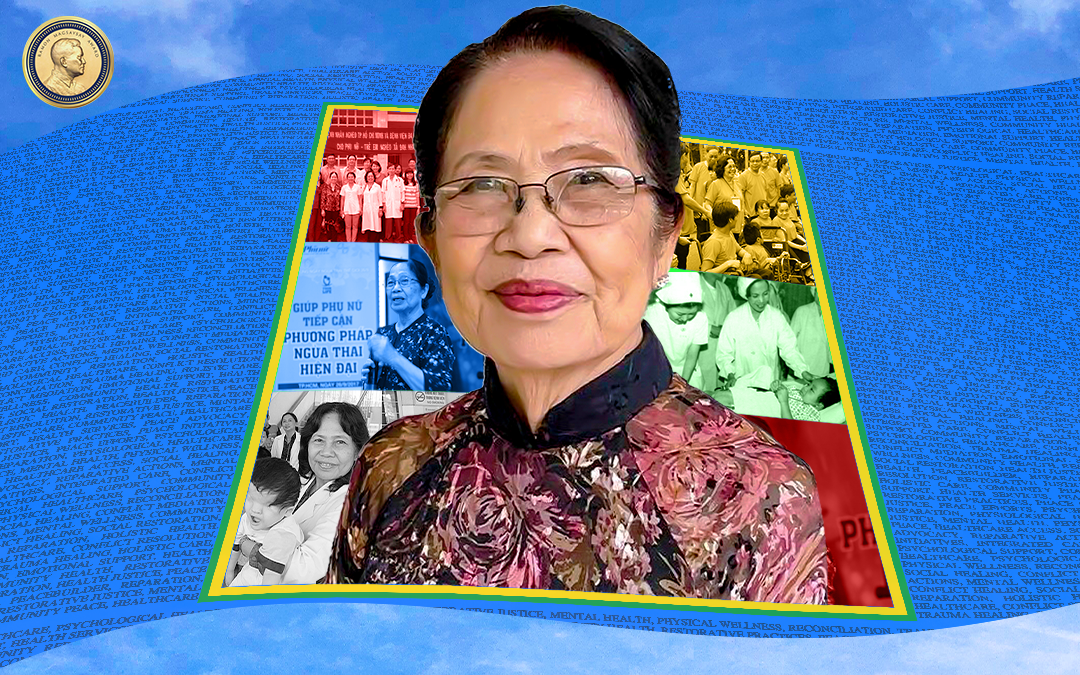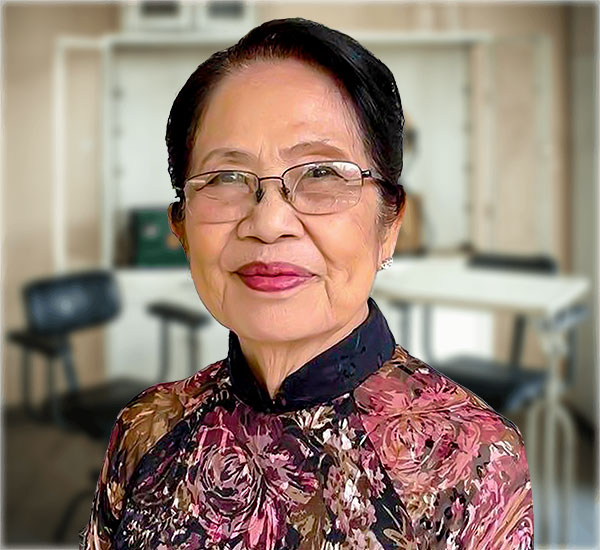- The Vietnam War, which lasted from 1955 to 1975, left deep trauma with over three million deaths, mostly civilians. Its lethal legacy endures, as the toxic chemical TCDD from Agent Orange, used extensively by American forces, continues to cause severe health issues across four generations, affecting millions of Vietnamese.
- NGUYEN THI NGOC PHUONG, who became a doctor during the Vietnam War, was deeply affected by witnessing severe birth defects in newborns, initially without understanding the cause. This led her to dedicate her life to uncovering the truth about Agent Orange, seeking justice for its victims, and aiding the afflicted through her research and work with the Vietnam Association of Victims of Agent Orange/Dioxin (VAVA).
- For PHUONG, the battle has not only been in the laboratory but also on the international stage. She has taken up the cause of Agent Orange victims with the American Public Health Association, among other forums, and supported legal action to seek compensation from chemical companies.
- The RMAF board of trustees recognizes her spirit of public service and the message of hope she continues to propagate among her people. At the same time, her work serves as a dire warning for the world to avoid war at all costs as its tragic repercussions can reach far into the future. She offers proof that it can never be too late to right the wrongs of war, and gain justice and relief for its hapless victims.
Lasting for two decades from 1955 to 1975, the war in Vietnam left a deep and horrific trauma, with more than three million deaths—two out of every three of them civilians—officially reported by the Vietnamese government. But these deaths were hardly the end of Vietnam’s ordeal. Half a century later, even newborn babies continue to suffer from its lingering effects, paying a heavy price for a conflict they merely inherited.
That lethal legacy literally remains in Vietnam’s war-ravaged soil and its environment—people who went through the war, not only the Vietnamese but the Americans as well who fought in that war. The culprit is tetrachlorodibenzodioxin (TCDD), one of the most toxic and poisonous chemicals known, and a component of “Agent Orange,” extensively used during the war by the Americans to clear the forest cover and expose their enemy, as well as to destroy the crops that sustained them. Between 1962 and 1971, about twenty million gallons of dioxin-imbued herbicides were sprayed from the air, in Vietnam, by American planes.
Not only did Agent Orange kill every plant that it touched within two days; its dioxin leached into surrounding waters, and into the fish and ducks that were staples of the Vietnamese diet. Soon, after the war, physicians reported a troubling increase in the incidence of miscarriages, skin diseases, cancers, birth defects, and congenital malformations among the people.
What took just seconds to deploy has damaged four generations of victims. The exact numbers remain elusive, but it is estimated that 4.8 million Vietnamese were exposed to dioxin, out of whom about three million became victims, including thousands of children in the second, third, and even fourth generations.
The suffering continues, and so does the war on the side of Vietnamese and other researchers who have taken up the fight against the devastating effects of Agent Orange. In Vietnam, that battle has been led by NGUYEN THI NGOC PHUONG (born 1944), the former director of Tu Du Hospital, the country’s largest obstetric hospital.
PHUONG came of age and became a doctor over the course of the war. At its peak, in 1968, she recalls that “When I was an intern, I delivered for the first time in my life, a severely deformed baby—it had no brain and limbs. It was horrible for me, I was nauseous, vomiting and shaking. And how was the scared young mother? She was in shock when she saw her baby. Since then, every day or two, I have witnessed such birth defects and mother’s sufferings. But, for many years, I didn’t know what caused these tragic events.”
That terrible mystery led her to undertake her life’s great mission: to find out the truth about Agent Orange, to seek justice for its victims, and to assist the afflicted in all ways possible. Prompted by a paper on the use of herbicides in Vietnam, PHUONG and her associates established that people in areas sprayed with Agent Orange suffered from birth defects three times more than in other places. She published her research and joined the Vietnam Association of Victims of Agent Orange/Dioxin (VAVA). With over 4,000 members, VAVA seeks accountability for the damage done by Agent Orange and brings relief to its victims.
For PHUONG, the battle has not only been in the laboratory but also on the international stage. She has taken up the cause of Agent Orange victims with the American Public Health Association, among other forums, and supported legal action to seek compensation from chemical companies. She is widely respected wherever she goes, recognized for her sincerity and humanity, beyond political considerations.
At the same time, she has remained the ‘baby doctor’ she always was, a pioneer of in vitro fertilization in Vietnam, bringing joy and hope to thousands of Vietnamese families who call her “Dr. Fairy.” She has also served in the National Assembly, championing legislation on family planning and reproductive health.
In electing NGUYEN THI NGOC PHUONG to receive the 2024 Ramon Magsaysay Award, the board of trustees honors not only a woman and physician of extraordinary dedication and talent, but also the spirit of public service and the message of hope she continues to propagate among her people. At the same time, her work serves as a dire warning for the world to avoid war at all costs as its tragic repercussions can reach far into the future. She offers proof that it can never be too late to right the wrongs of war, and gain justice and relief for its hapless victims.
Honored guests, ladies and gentlemen:
It is with deepest and sincerest gratitude that I accept the 2024 Ramon Magsaysay Award. I extend my heartfelt thanks to the Board of Trustees of the Ramon Magsaysay Award Foundation for electing me to receive this recognition.
Being chosen for the Ramon Magsaysay Award is not just my honor; it belongs to all of my colleagues and the peoples of Vietnam who have selflessly dedicated our lives to this cause.
Our journey began in 1976 at Tu Du Hospital, where my colleagues and I conducted a retrospective study followed by numerous surveys and case-control studies on Agent Orange / Dioxin in provinces across Southern Vietnam.
The results were both staggering and horrifying: we have established the causal effects of Agent Orange/Dioxin on birth defects in children of exposed mothers or fathers, as well as various types of cancers observed in people living in the sprayed areas during wartime.
Since 2004, alongside my dedicated and passionate colleagues in VAVA (Vietnam Association for Victims of Agent Orange), we have been raising global awareness about the dangerous effects of Agent Orange, especially the dioxin contaminant, on reproductive health and its carcinogenic impact—effects that are still being felt four generations after the end of the war.
We have also been helping victims by demanding accountability for these horrors and by bringing them much-needed justice, including testifying before the U.S. House of Representatives on the long-term consequences of Agent Orange / Dioxin.
We hope that through our efforts, the quality of life of the millions of victims will improve; and their physical, emotional and spiritual wounds be healed. That we as a country will heal.
The Ramon Magsaysay Award will greatly encourage VAVA members and myself to continue our work, supporting and advocating for the Agent Orange/Dioxin victims as they face life’s profound challenges with remarkable resilience.
This prestigious recognition sends a strong and resounding message to the global community that we need international understanding not warfare; we need conflict resolutions and not weapons of mass destruction; we need peace.
I dedicate Ramon Magsaysay Award to the millions of victims of Agent Orange.
Thank you.
Related Articles

Champion of Agent Orange Victims Among 2024 Ramon Magsaysay Awardees
Sep 5, 2024

